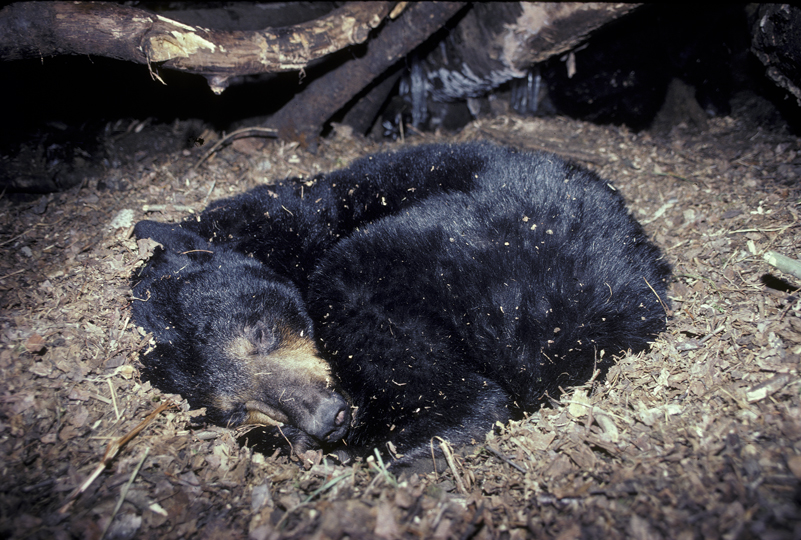

Do Black Bears Hibernate?
Short answer: yes.
When people defined hibernation simply in terms of temperature reduction, bears were not considered hibernators. However, when biologists discovered the many metabolic changes that let black and grizzly bears hibernate up to 7 ½ months without eating, drinking, urinating, or defecating, they realized that body temperature was only a small part of hibernation.
They redefined mammalian hibernation as a specialized, seasonal reduction in metabolism concurrent with scarce food and cold weather (Watts et al. 1981).
Black bears are now considered highly efficient hibernators. Hibernators the size of chipmunks hibernate differently. They lower body temperature to near freezing but wake up every few days to raise body temperature to near normal, eat stored food, and eliminate body wastes. Then they lower body temperature and repeat the cycle.
The confusion about what to call black bear hibernation is a matter of definition. Further confusion has arisen because it differs with region and fatness (see other exhibits).
People have called black and grizzly bear hibernation torpor, winter sleep, dormancy, and carnivorean lethargy. The leading physiologists now simply call it hibernation.
References:
Ahlquist, D. A., R. A. Nelson, D. L. Steiger, J. D. Jones, and R. B. Ellefson. 1984. Glycerol metabolism in the hibernating black bear. Journal of Comparative Physiology, B. Biochemical, Systematic, and Environmental Physiology, 155:75-79.
Hellgren, E. C., M. R. Vaughn, R. L. Kirkpatrick, and P. F. Scanlon. 1990. Serial changes in metabolic correlates of hibernation in female black bears. Journal of Mammalogy, 71(3):291-300.
Nelson, R. A. 1980. Protein and fat metabolism in hibernating bears. Federation Proceedings, 39:2955-2958.
Nelson, R. A., D. L. Steiger, and T. D. I. Beck. 1983. Neuroendocrine and metabolic interactionsin the hibernating black bear. Acta Zoologica Fennica, 174:137-141.
Watts, P. D., N. A. Oritsland, C. Jonkel, and K. Ronald. 1981. Mammalian hibernation and the oxygen consumption of a denning black bear. Comparative Biochemistry and Physiology, A. Comparative Physiology, 69:121-123.
We are a 501(c)(3) non-profit that relies entirely on the support of visitors, merchandise sales and people like you. We do not receive any state or federal funding.
Help support our mission.
Donate Now